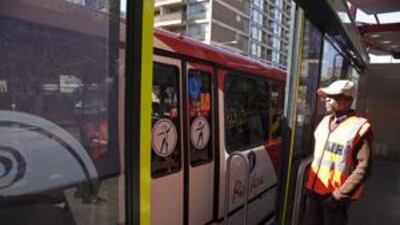JOHANNESBURG // An armoured vehicle rolls slowly past the Johannesburg Art Gallery bus stop in the centre of South Africa's economic capital, packed with soldiers, while two more patrol the platform on foot, their assault rifles at the ready.
Launching a bus service is not normally something that needs uniformed military protection, but the Rea Vaya, or We Are Moving, bus rapid transit (BRT) system is taking on one of South Africa's most ingrained, and potentially violent, vested interests - the minibus taxi industry. The physical space of South African cities remains structured by the legacy of apartheid. The majority black population were confined to townships, often many kilometres from the city centres, where the black urban masses still live today, and public transport in the country suffered from decades of under-investment as a result.
The white authorities had little or no interest in developing services for the townships and the infrastructure serving them was appallingly underdeveloped, with suburban train lines rare and bus services infrequent. Stepping into the breach, black entrepreneurs set up their own services using minibuses, known as "taxis", which are now the mainstay of public transport in the country. Renowned for their flexible attitude to the rules of the road, they compete on speed, stop without warning to pick up or drop off fares, and shift hundreds of thousands of passengers every day, despite a dire safety record and chronic overcrowding.
It is a cut-throat business, sometimes literally, with armed conflicts occasionally breaking out for control of lucrative routes, and drivers and even passengers being killed in the crossfire. Now, as the 2010 World Cup approaches, city authorities have invested two billion South African rand in a new bus system in an effort to improve services for the hundreds of thousands of visitors expected for the tournament, and local residents, but it has provoked fury from the taxi industry.
Taxi associations have demanded shares in the bus operating companies, despite not making any investment themselves. Association representatives have also gone to court seeking to stop the service from launching, claiming they have intellectual property rights over the bus routes amid fears of public violence. A few days after the initial service began last week, with 40 buses operating on a route from Soweto through the Johannesburg city centre to the Ellis Park stadium, two passengers were wounded when a bus was attacked by gunmen.
A few metres away from the Art Gallery bus stop, three police cars stood at the roadside. "Anything is possible with these people," said one officer. "We don't know what might happen." For commuters, though, the service is a boon. With dedicated lanes, the Rea Vaya system promises a more efficient way of getting around the city, and with most fares set at only five rand (Dh2.4), the economies of scale generated by the large vehicles being used, some of them as big as 150 seats, are set to drive the taxis out of business.
Passenger numbers averaged more than 10,000 a day on the first two days, and are expected to increase substantially as the service broadens. "It's cheaper and it looks like its faster than any other transport," said Sam Mazibugo, 40, who was taking it for the first time to go to Orlando in Soweto. "It's a good thing, you need to have alternative transport. This service should be countrywide." More routes are planned through Johannesburg and other cities across the country, with the system due to expand rapidly after its limited start over the next few months.
While the bus system undoubtedly benefits ordinary commuters, taxi drivers are in a panic over their endangered livelihoods. "It's causing hunger and bringing poverty to black people," said Sipho Dlamini, 26. "I was taking six people, now I'm taking three. When this industry started, the government was not included, so why is the government coming and taking the jobs now?" "There will be no peace," threatened Richard Mbata, 28.
The system is effectively a test for the new administration of the prime minister Jacob Zuma, who initially sought to reassure the taxi operators, delaying the launch until they had been further "consulted". But the government has since made clear that it was willing to take on the taxi industry and that violence would not be tolerated. The struggle, though, is likely to be long and bitter. Because of the ubiquitousness of their vehicles, the taxi associations are able to bring entire cities to a standstill by withdrawing their services, and did just that on the first day of the Rea Vaya operations.
Neva Makgetla, the lead economist at the Development Bank of Southern Africa, said there was no alternative to ensuring that the BRT was a success. Condemning the taxi system as "anarchic and underfunded", she added: "Every commuter knows that a risky, expensive, unreliable and miserably overcrowded trip to work can ruin your day." sberger@thenational.ae

